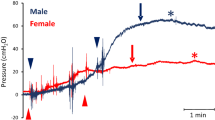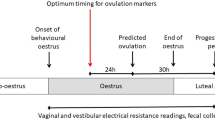Abstract
WE recently observed1 that although an intra-uterine device (IUD) did not affect ovulation and fertilization, it was contraceptive in the rhesus monkey. The pattern of tubal transport was not markedly disturbed, but eggs could not be recovered from the uterus in IUD monkeys. It was inferred that the principal contraceptive effect of the IUD is probably exerted within the uterus, to cause either premature expulsion and/or premature destruction of the fertilized egg. The presence of an IUD may therefore disturb the pattern of uterine motility in the rhesus monkey.
This is a preview of subscription content, access via your institution
Access options
Subscribe to this journal
Receive 51 print issues and online access
$199.00 per year
only $3.90 per issue
Buy this article
- Purchase on Springer Link
- Instant access to full article PDF
Prices may be subject to local taxes which are calculated during checkout
Similar content being viewed by others
References
Kelly, W. A., and Marston, J. H., Nature, 214, 735 (1967).
Bass, P. Callantine, M. R., Nature, 203, 1367 (1964).
Harper, M. J. K., Bennett, J. P., Boursnell, J. C., and Rowson, L. E. A., J. Reprod. Fertil., 1, 249 (1960).
Corner, G. W., Contrib. Embryol. Carnegie Inst., 31, 117 (1945).
Author information
Authors and Affiliations
Rights and permissions
About this article
Cite this article
MARSTON, J., KELLY, W. Effect of an Intra-uterine Device on Uterine Motility in the Rhesus Monkey. Nature 217, 774–776 (1968). https://doi.org/10.1038/217774a0
Received:
Revised:
Issue Date:
DOI: https://doi.org/10.1038/217774a0
Comments
By submitting a comment you agree to abide by our Terms and Community Guidelines. If you find something abusive or that does not comply with our terms or guidelines please flag it as inappropriate.



